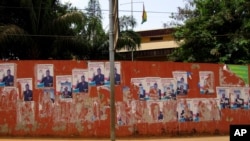Three weeks after Guinea-Bissau's military seized control in a coup, the country is still in crisis. As West African leaders meet in Dakar on the situation, citizens of Guinea-Bissau have been sharing their thoughts on the way forward.
Tensions remain high in the seaside capital, Bissau, in the aftermath of the military coup.
On April 12, soldiers loyal to army chief Antonio Indjai ousted interim President Raimundo Pereira and his prime minister, Carlos Domingos Gomes, Jr.
Although Pereira and Gomes have since been freed and evacuated to Abidjan, life has still not returned to normal.
Bullet holes are visible outside the home of Gomes, but electoral campaign posters depicting the ousted prime minister's smiling face still hang from buildings around the capital.
Gomes was the frontrunner in a second round presidential vote scheduled for the end of April. The election was derailed by the coup.
Mario Gabriel Incanha, who lives in the capital, Bissau, says the coup was a necessary evil that might ultimately usher in more stability. He says an ECOWAS military force would be a way of stabilizing the country.
Since independence from Portugal in 1974, periods of stability in Guinea-Bissau have been rare.
In the last three years, there have been several coups and counter-coups following the assassination of President Bernardo 'Nino' Vieira.
On Thursday, the European Union slapped economic and diplomatic sanctions on six people who it said played a part in April's coup.
A Portuguese ship is on standby in Lisbon, in case expatriates have to be evacuated from the former Portuguese colony.
Support for the military is generally low in Bissau. Most people are desperate for stability to get on with their lives.
Some public offices and businesses have been closed since the coup. Banks are running skeletal operations, opening in the mornings only because of security concerns.
Mamamdu Sambu says the military has effectively run the country since the end of the civil war in the late 1990s. He says Bissau-Guineans are tired of the constant rivalry between the military and the government. He says the way forward is by engaging in dialogue, he said.
In the evenings, Bissau-Guineans crowd around television sets in order to learn the latest developments.
But access to state electricity is still sporadic in the country of 1.6 million. Even in the capital, most neighborhoods plunge into darkness after sundown.
Augusto Correia, who is unemployed, says the ongoing political instability has made everyone's life harder. Instead of enjoying peace and the benefits of development, he says many Bissau-Guineans have to fight to make ends meet.
During an earlier ECOWAS meeting on Sunday, Gambian leader Yahya Jammeh, who was chairing the crisis talks that day, said West Africa was "losing patience" about the crisis in Guinea-Bissau.
Many Bissau-Guineans say they feel the same way. They are desperate to see a return to constitutional rule.
News
Bissau-Guineans Tired of Political Instability
- By Kate Thomas




